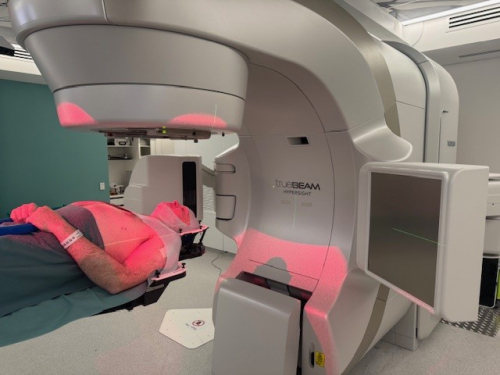Treatment breakthrough for aggressive blood cancer

Scientists from The Alfred and Monash University are hailing a drug designed to combat an aggressive blood cancer as one of the most promising advances against the disease in more than 40 years.
Using a small molecule to target the cancer, together with low dose chemotherapy, The Alfred has participated in a clinical discovery that has caught the attention of the United States Food and Drug Administration - giving it ‘breakthrough designation' to fast-track the research off the back of promising results.
Each year in Australia, 1,000 patients die from Acute Myeloid Leukaemia (AML) - some surviving only weeks from the time of diagnosis - but this latest developmentmay offer true hope for some patients.
Dr Andrew Wei, a haematologist at The Alfred and Monash University, said the advancement is changing his view of the disease.
"AML research used to be likened to a ‘clinical trial graveyard' because trials of new drugs into AML were rarely successful," Dr Wei said. "It was seen as an untreatable and inevitably fatal condition for elderly AML patients by most doctors.
"We're finally shifting the disease from one that was rarely rewarding to treat to one of great excitement and interest in treating now.
"In the first wave of patients who received the new combination therapy, the complete remission rates, and duration of the remissions, have been extremely promising."
Previous trials, using either the targeted molecule (Venetoclax) or low dose chemotherapy, produced only a modest result, with responses in about 20 per cent of patients. When used together Dr Wei said the difference was striking, with 60-70 per cent of trial participants going into remission.
"Cancer cells are different to normal cells because they don't die when they should. Instead of being discarded, these abnormal cells continue to survive and replicate," Dr Wei said.
"This molecule works by finding its way into a groove on one of the proteins (BCL2) that controls the survival of the leukemic cells. Once sitting in this ‘pocket' it can flick on the ‘death switch' in the cancerous cell and the cell dies.
"When we add low-dose chemotherapy to weaken and destabilise the cells it makes the molecule much more effective at killing them - leading to clinical benefits in the majority of patients treated."
"For the first time, we have something new to offer in the fight against AML," Dr Wei said.
Dr Wei is also leading a new academic trial aimed at further improving the remission rate for newly diagnosed patients with AML aged 65 years and over.
This trial is supported by a Victorian Cancer Agency clinical trials initiative and will enrol patients at The Alfred, Royal Melbourne Hospital and The Austin Hospital in Victoria.
The study will combine the BCL2 inhibitor, Venetoclax, with a modified dose of standard chemotherapy.
For more information on trial participation, phone the clinic on (03) 9076 3451.


